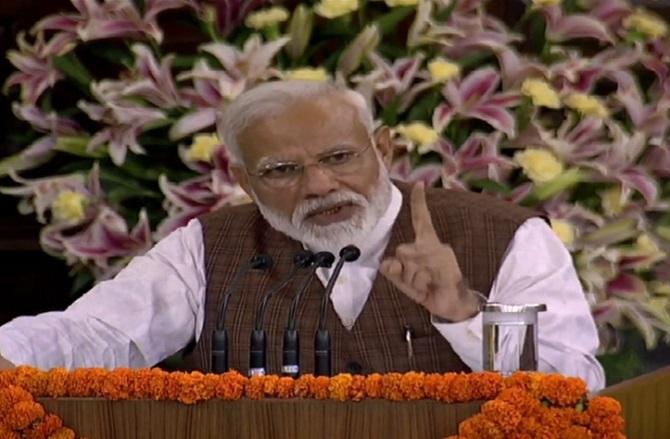 | « Back to article | Print this article |
'Seems more than half of the 'desh' remained untouched by his 'samajik ekta ka andolan',' points out Jyoti Punwani..

'Teerthyatra (pilgrimage).'
That's the word Narendra Damodardas Modi used in his address in Parliament on Saturday night, to describe the just concluded election campaign that brought him to the peak of his success.
The word was chosen carefully by a man who knows its emotional connotations for Hindus, the constituency he has carefully and consistently cultivated since the Gujarat carnage of 2002.
Given that the PM and his party chief contributed substantially to communalising the campaign, this doublespeak was astounding.
Amit Anilchandra Shah's use of the names 'Alia, Maliya, Jamaliya' to indicate illegal infiltrators whom he would throw out of the country; his use of the old war cry 'Jai Sri Ram' in Kolkata; Modi's repeated taunts about Rahul Gandhi 'running away and seeking shelter in a constituency where the majority is the minority', as if seeking votes from Muslims and Christians was a crime -- these are just three examples that came to mind listening to Modi speak in Parliament.
What were these if not attempts to seek votes by appealing to religious identity, and actually sowing hostility in the minds of Hindus against Muslims and Christians?
Both constitute offences under the India Penal Code as well as the Election Code.
Given the Election Commission's craven surrender this election, Modi could blithely pretend the campaign had been 'a movement for social unity', which 'joined hearts' and 'broke walls'! Sure, it joined Hindu hearts, while helping strengthen the walls between the majority and minorities that the ruling party has erected over the last five years.
The Waynaad jibe marked a new low, but the PM described the campaign as having touched new heights ('nayi unchaai').
The country had set out with him in this campaign, said the PM ('Desh saath chal pada'), when the world and he knew that the country's largest minority (for the most part), as well as a significant section of Dalits and Christians had either stayed aloof from his 'teerthyatra', or actually worked hard to counter it.
At any rate, the final results show that 37% of 67% eligible voters set out with him.
Seems more than half of the 'desh' remained untouched by this 'samajik ekta ka andolan'.
In the same vein, Modi spoke of his five year reign having been untouched by any major storm, even in the media.
His government had done nothing wrong except for the reckless utterances of some party members.
Obviously, the lynchings of Muslims by goons connected to the ruling party, which made headlines in our English press, and even on worshipful TV channels, disturbed our prime minister less than the embarrassment caused by the venomous utterances of his party colleagues.
In the supremely skillful way the PM frames his sentences, Modi made it clear that he had nothing to do with these utterances.
('Aisi aisi cheezein hamaarey khaatey mein jama ho jati hai jinsey hamara koi lena dena nahin.')
If that is so, why did he never act against those causing him such embarrassment?
For an hour, the prime minister spoke to his MPs as a kind but firm headmaster would to his students.
The man whose every public move is geared towards the camera advised his captive audience, some of them politicians more experienced at the national level than him, not to be seduced by the camera.
Yet, bhakts are not just joking about what Rahul Gandhi would have said had he won, but even comparing this speech to Nehru's 'Tryst with Destiny'!
Just when you were wondering how much longer he would go on, the PM made you sit up.
Modi expressed regret, without saying it in so many words, that the minorities had been left behind in this wave that swept him to power.
He wished they had developed their own leaders and achieved equal economic status with the rest.
There are many reasons for Muslim backwardness, one of them being the frequency of communal riots.
You don't need to be an economist or sociologist to know that every major riot sets Muslims back economically and education-wise, and pushes more and more of them out of the mainstream.
And not even the most diehard bhakt can deny that the Sangh Parivar, to which Modi belongs, has played a major role in most major Hindu-Muslim riots since Independence, even if they call that role 'defensive'.
But, of course, Modi, with the 2002 Gujarat behind him, and about 40 Muslims lynched by his followers in the last four years, attributed this condition of Muslims to those who, because of vote bank politics, had 'cheated' them and surrounded them with an 'imaginary atmosphere of fear' and 'imaginary fears' ('kalpanik vatawaran, kalpanik bhay').
This allegation was uttered just a few minutes after he had spent considerable time referring to the objectionable utterances of his party colleagues! 90% of these utterances have been directed against Muslims.
But Modi has already defeated these parties, which wear the 'naqaab' of secularism (the word used by him in his victory speech).
What more needs to be done?
'We have said nothing and simply handed them over to these parties,' rued the PM.
Let's ignore the contrast between the expansive way Modi spoke about the 'desh', including its 'gareeb janta', and this stark use of 'we' and 'them'.
This statement raises one basic question.
After the results, many Muslims themselves feel it's about time they freed themselves from the Congress and other such 'naqaabi' parties.
But is it even possible for the BJP, a party rooted in the RSS, whose newest MP is facing trial for planning a bomb blast that killed 10 Muslims, to win over the community?